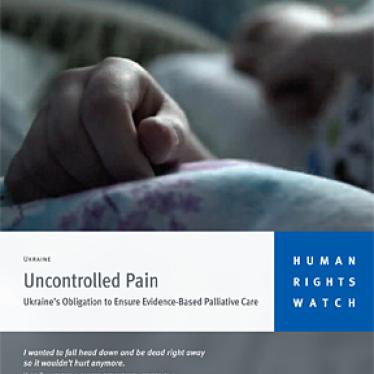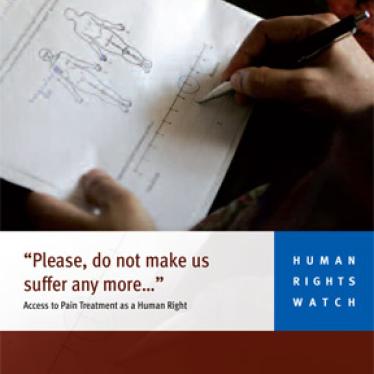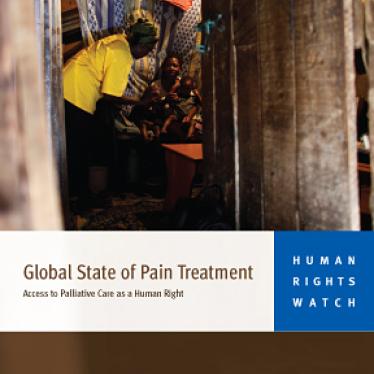(Kiev) - Tens of thousands of patients with advanced cancer in Ukraine unnecessarily suffer from severe pain every year because they cannot get effective, safe, and inexpensive pain medications, Human Rights Watch said in a report released today.
The 93-page report, "Uncontrolled Pain: Ukraine's Obligation to Ensure Evidence-Based Palliative Care," describes Ukrainian government policies that make it impossible for cancer patients living in rural areas to get essential pain medications. While most cancer patients in cities have access to some medications, the treatment they receive is inadequate and provides only limited relief, Human Rights Watch found.
"There is no reason people have to live out their last months in torment," said Diederik Lohman, senior health researcher at Human Rights Watch. "Severe pain is not inevitable. Ukraine needs to fix its health policies and drug regulations to put safe and effective pain medicines in the reach of people who need them."
The report is based on in-depth interviews with 20 patients, 35 healthcare workers, and a dozen drug control and health officials and a review of relevant regulations and policy documents.
At least 80,000 cancer patients in Ukraine experience severe pain every year, cancer mortality figures suggest. In addition, many other patients, including those with HIV, Tuberculosis, or other infections or illnesses, may face acute or chronic severe pain.
The World Health Organization says that "[m]ost, if not all, pain due to cancer could be relieved if we implemented existing medical knowledge and treatments." Basic oral morphine is inexpensive and can be administered by patients or family members in the same fashion as any oral medicine.
The report identified three key obstacles to proper pain treatment in Ukraine:
- The lack of oral morphine. For decades, oral morphine has been the cornerstone of cancer pain treatment. The World Health Organization considers it an essential medicine. Yet, Ukraine's government has failed to make the medication available through the public health care system. It is not available in private clinics either. Only two other European countries - Armenia and Azerbaijan - do not stock oral morphine.
- Drug regulations. In its efforts to crack down on illicit drug use, Ukraine has adopted some of the most restrictive drug regulations in the world, without appropriate regard to the need for access to drugs on medical grounds. These regulations severely interfere with the medical availability of medications like morphine.
- Training of health care workers. Medical students and young doctors do not receive adequate training in modern pain treatment approaches.
These three obstacles combine to deny patients adequate medical treatment, Human Rights Watch said. For example, Ukraine's drug regulations require injectable morphine - the only formulation of the medication available in the country - to be administered by a health care worker directly to the patient. Since morphine acts for just four to six hours, this means that a health care worker must visit a patient who is dying at home, as most cancer patients in Ukraine do, six times a day. Human Rights Watch research shows that most patients get either no morphine or one or two doses a day. If oral morphine were available, patients could receive a take-home supply and take the medications themselves.
In meetings to discuss the findings of this research, drug control officials have told Human Rights Watch that they believe current regulations are unnecessarily restrictive and need to be reformed.
The report also recommended expanding training for health care workers in pain treatment.
"Patients told us their suffering was so great that they would prefer to die than live with their pain," Lohman said. "The Ukrainian government needs to urgently introduce oral morphine and reform its unbalanced drug regulations."
Selected Quotes From Patients
"I wanted to fall head down and be dead right away so it wouldn't hurt anymore."
- - Vlad Zhukovsky describing a failed suicide attempt
"The pain was so bad that my whole body seemed to break. We would call the ambulance every two to three hours because I could not stand it."
- - Konstantin Zvarich describing his pain in a village in rural Poltava
"The pain was intolerable with any movement and became more severe with every day because of the pathological process in his hip joints. The pain affected his sleep, appetite, and his psychological condition. He became very irritable and nothing could make him happy anymore. A normal sneeze or cough caused him terrible pain ... You could knock on the wall, and if he was lying over there, he would scream [in pain]..."
- - Natasha Malinovska describing the pain her husband, a non-cancer patient, faced.








